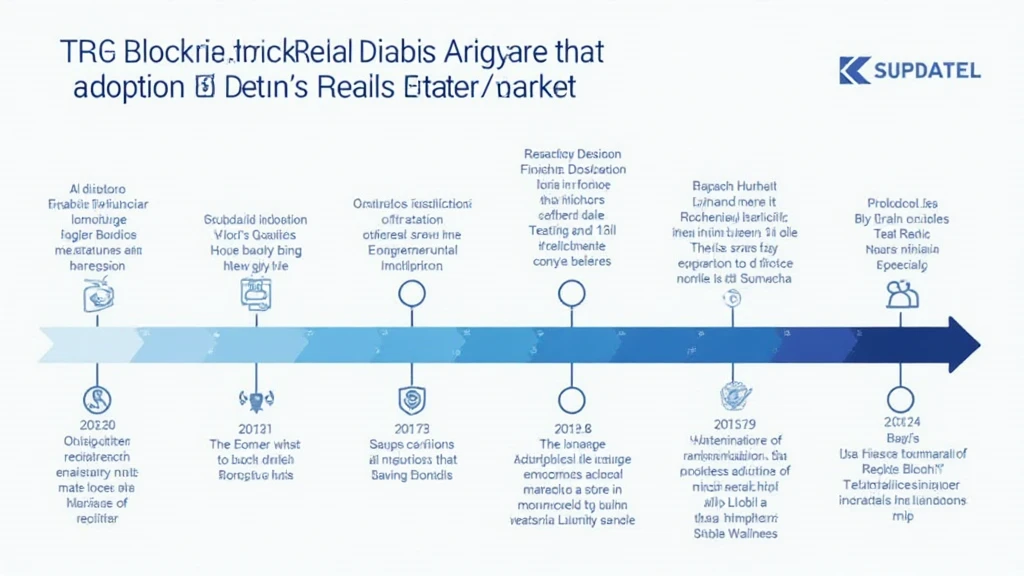Introduction
In recent years, the intersection of blockchain technology and real estate has gained substantial traction globally. In Dubai, a city already recognized for its innovative approaches, the adoption of blockchain in real estate transactions is not just an option; it’s becoming increasingly mandatory. With reports indicating that $4.1 billion was lost to DeFi hacks in 2024, the demand for secure and transparent transactions has skyrocketed. This article aims to detail the timeline of blockchain adoption within Dubai’s real estate industry, discussing its implications, benefits, and future trends.
The Initial Steps: 2016-2018
The foundational steps in the adoption of blockchain technology in Dubai’s real estate market can be traced back to 2016. The Dubai Land Department (DLD) initiated its efforts towards incorporating blockchain technology in property transactions. By 2017, the UAE government announced its ambition to become a global leader in blockchain technology by 2020. This drive was reflected in strategies that aimed at boosting smart transactions, reducing paperwork, and enhancing transparency in real estate dealings.
- 2016: Dubai Land Department initiated blockchain discussions.
- 2017: UAE government set a vision for blockchain adoption.
- 2018: DLD launched a pilot project to tokenize properties.
The Regulatory Framework: 2019
In 2019, the legal framework surrounding blockchain technology in Dubai’s real estate market began taking shape. The DLD established regulations that govern blockchain’s application in property transactions. These regulations were designed to offer legal clarity, ensuring that all transactions conducted through blockchain are legitimate and enforceable under UAE law. Additionally, the first rental contracts were registered using blockchain technology, highlighting the practical benefits of the system.

- Legal regulations: Clarity in the use of blockchain technology.
- First rentals: Digitized contracts on blockchain.
Commercial Uses and Public Awareness: 2020
With a solid regulatory framework in place, 2020 marked a year of significant commercial use of blockchain in Dubai’s real estate sector. Various companies began experimenting with blockchain to facilitate transactions and streamline processes. The DLD announced that by 2021, it aims to have 100% of real estate transactions conducted through blockchain. The awareness among the general public regarding the benefits of blockchain began to flourish, paving the way for wider acceptance.
- Commercial experimentation: Companies utilize blockchain.
- Aim for 100%: DLD targets full blockchain integration by 2021.
The Rise of Digital Tokens: 2021-2022
By 2021, the tokenization of real estate assets gained momentum. Investors could purchase fractions of properties through digital tokens, democratizing real estate investments. This development attracted international investors who were previously deterred by high entry costs associated with real estate purchases. The success of the first few tokenized property sales validated the model, leading to more entities considering tokenization as a viable option.
- Tokenization: Fractional ownership through blockchain.
- International investors: Access to Dubai’s real estate market.
Market Development and Technological Advancements: 2023
As we move into 2023, Dubai’s real estate market has seen unprecedented growth due to the robust integration of blockchain technologies. Imminent advancements such as Non-Fungible Tokens (NFTs) have emerged in real estate listings, providing unique identifiers to properties and simplifying transactions through smart contracts. The market also witnessed an influx of blockchain startups aiming to improve various aspects of real estate transactions through innovative technology solutions.
- NFTs: Unique property identifiers.
- Startups: Focused on improving transaction processes.
The Future Ahead: 2024 and Beyond
Looking towards 2024 and beyond, experts predict that Dubai will become a global hub for blockchain-based real estate transactions. As the adoption of tiêu chuẩn an ninh blockchain increases, the real estate market’s structural evolution will ensure that transactions are more efficient than ever. New technologies such as Artificial Intelligence (AI) and machine learning will further drive innovation in property evaluations and predictive analytics in the market.
- Global hub: Dubai positioned as a leader in blockchain.
- Technological integration: AI and machine learning for the future of real estate.
Conclusion
In summary, the adoption of blockchain technology in Dubai’s real estate market has progressed rapidly since 2016. Major milestones such as regulatory advancements, the rise of digital tokens, and the integration of NFTs highlight Dubai’s commitment to transforming how real estate transactions are conducted. As the market continues to evolve, we can expect unprecedented growth and innovation that will not only benefit local stakeholders but will also attract international investors eager to capitalize on Dubai’s unique offerings. For those engaged in the real estate market, staying informed will be essential as we witness the blockchain adoption timeline continue to unfold.
Ultimately, as the industry solidifies its blockchain foundations, investors and real estate professionals must adapt to this technological evolution to maximize their success in an increasingly digital landscape. Stay tuned to platforms like cryptobestnews for the latest insights on blockchain and real estate.
Blockchain Adoption Timeline” />



